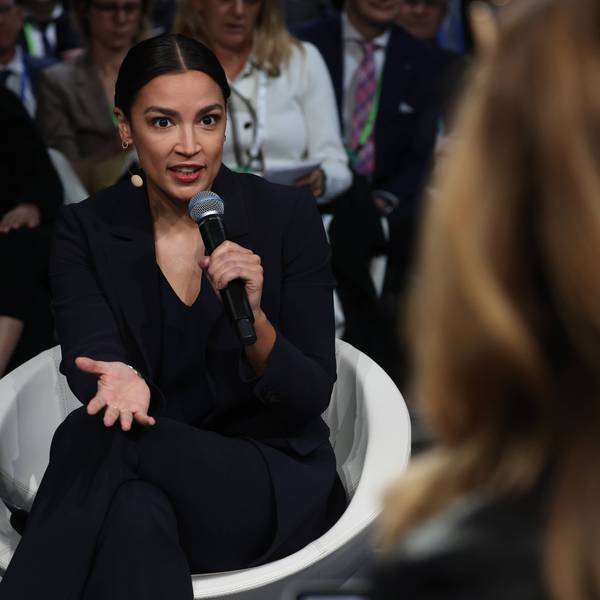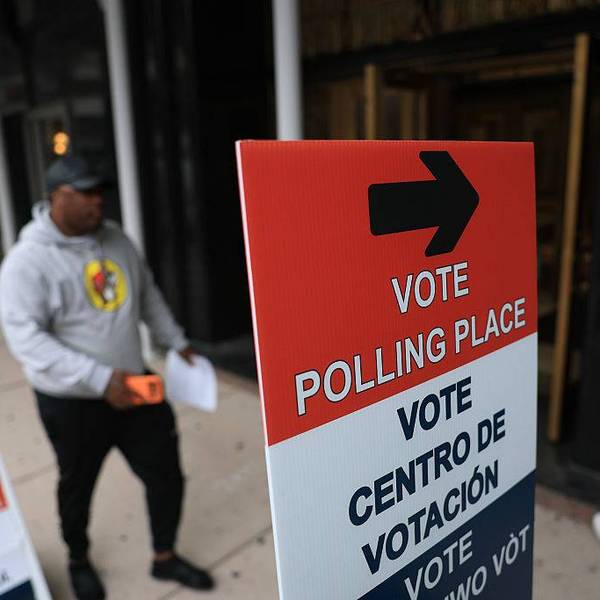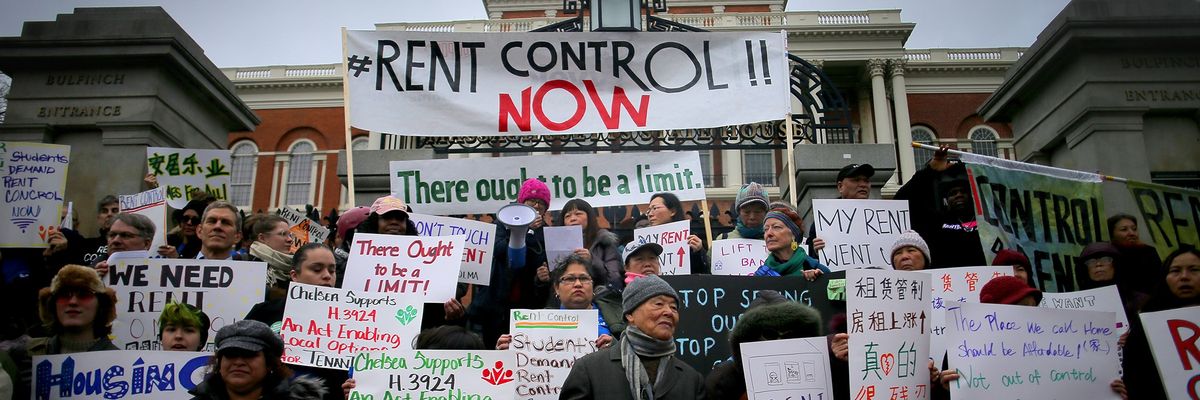An analysis released Tuesday bolsters an argument that progressive lawmakers and organizers have been making with growing urgency in the lead-up to the critical November elections: Housing should be at the top of the Democratic Party's—and President Joe Biden's—agenda.
The research brief, authored by Russell Weaver of the Cornell University School of Industrial and Labor Relations (ILR) Buffalo Co-Lab, shows that tenants are a "large, untapped political base" that can be mobilized by candidates who offer bold solutions to the housing crisis and support the rights of renters against the predatory landlords squeezing them for profit.
While homeowners typically turn out to vote at a far higher rate than tenants, Weaver noted, the "owner-renter turnout gap is nearly cut in half when candidates run on renter-friendly platforms." Renters in New York state (NYS)—the focus of the new analysis—are more likely than homeowners to be registered as Democrats or members of the Working Families Party.
Analyzing the results of New York's statewide general election in 2022, Weaver found that NYS tenants "might have been relatively motivated to turn out for candidates who were vocal supporters or co-sponsors of the 2022 state-level Good Cause Eviction bill, which protects renters against rent hikes and evictions."
"In NYS Senate races that did not feature such a candidate, the average turnout rate among likely renters was roughly 29% (after adjusting for race-ethnicity and political party)," Weaver wrote. "In races that included Good Cause proponents, however, average renter turnout was more than five percentage points higher, at 34.1%—a statistically significant difference."
Weaver said in a statement that his analysis underscores that "candidates who campaign on housing affordability and tenant protections have the potential to significantly boost renter turnout, which could be decisive in tightly contested races."
"An organized tenant voting bloc could be the key to jump-starting a statewide housing policy agenda that works for all New Yorkers," said Weaver.
The findings could also have implications for national races as rent remains high across the country, leaving roughly half of U.S. tenants unable to afford their monthly payments as corporate landlords and billionaire investors gobble up rental properties and drive up costs. The Federal Reserve is also making the crisis worse by keeping interest rates elevated.
"This brief tells us what we already know: Renters are a powerful voting bloc that will determine the 2024 election," Katie Goldstein, a housing justice organizer at the Center for Popular Democracy (CPD), said of Weaver's analysis. "We can't leave these votes on the table."
"Tenant champions who run on these issues will be rewarded at the ballot box—and politicians who fail to do so will be voted out of office."
CPD, Right to the City Action, and HIT Strategies released survey data earlier this month showing that 87% of U.S. voters believe the "cost of rent and housing is a major or big problem in their state" and that 70% said they are "more likely to vote for someone who supports rent stabilization policies."
The new research brief and polling data strengthen the case for making housing a top priority for an incumbent president and Democratic lawmakers hoping to defeat their Republican opponents in November.
"Tenant protections aren't just good policies—they're good politics," said Esteban Girón, member of the Tenants PAC Board. "Candidates have the opportunity to win big by committing to keep rents affordable and protect tenants from displacement."
At a gathering in Los Angeles in early April, Sen. Bernie Sanders (I-Vt.) joined Reps. Pramila Jayapal (D-Wash.), Ro Khanna (D-Calif.) and other lawmakers at the national, state, and local levels in imploring Democrats to elevate bold housing policies and tenant protections such as federal rent control to the top of the party's agenda.
"This is the richest country on Earth. We're not a poor country," Sanders said at the event. "Can we build affordable housing that we need? Can we protect? And the answer is of course we can. But it will require a massive grassroots effort to transform our political system to do that."
Politico reported earlier this year that Biden has privately expressed "increasing concern" that housing costs are putting his reelection hopes in jeopardy.
"The White House is now pushing a range of bulked-up tax credits to incentivize existing homeowners to sell their starter homes, as well as expand rental assistance and extend help for lower-income buyers with their down payments," the outlet noted. "Yet all those ideas require legislation. And while the White House has publicly argued the crisis affects red states just as much as blue states, aides privately acknowledge any movement is a long shot in an election year. Indeed, Republicans have been quick to pan Biden's housing push."
Presumptive Republican nominee Donald Trump, meanwhile, has not released a housing agenda as he vies for another four years in the White House. During his first term as president, Trump repeatedly pursued steep cuts to federal housing programs and assailed affordable housing initiatives.
Brahvan Ranga, political director of For the Many, said Tuesday that it is "critical we elect legislators who will enact policies that expand tenants' rights, create and maintain affordable green social housing, and affirm housing as a guaranteed right."
"The housing crisis is front of mind for tenants as they head to the polls—both in Democratic primaries and general elections. As housing costs continue to rise and working families struggle to stay in their homes, corporate real estate and greedy landlords are raking in record profits," said Ranga. "Tenant champions who run on these issues will be rewarded at the ballot box—and politicians who fail to do so will be voted out of office."




